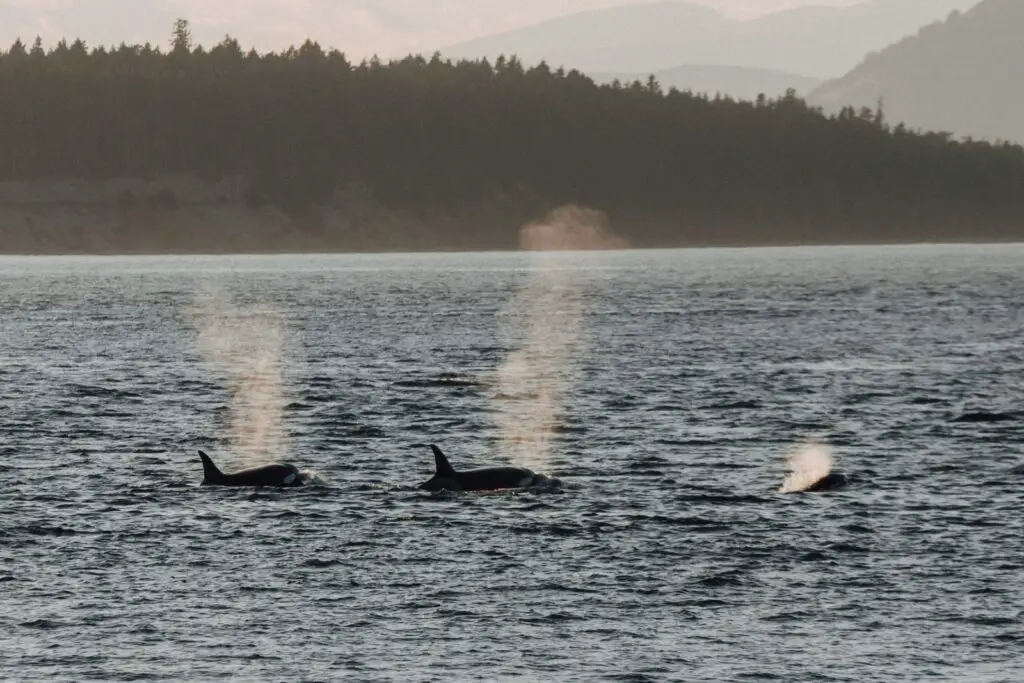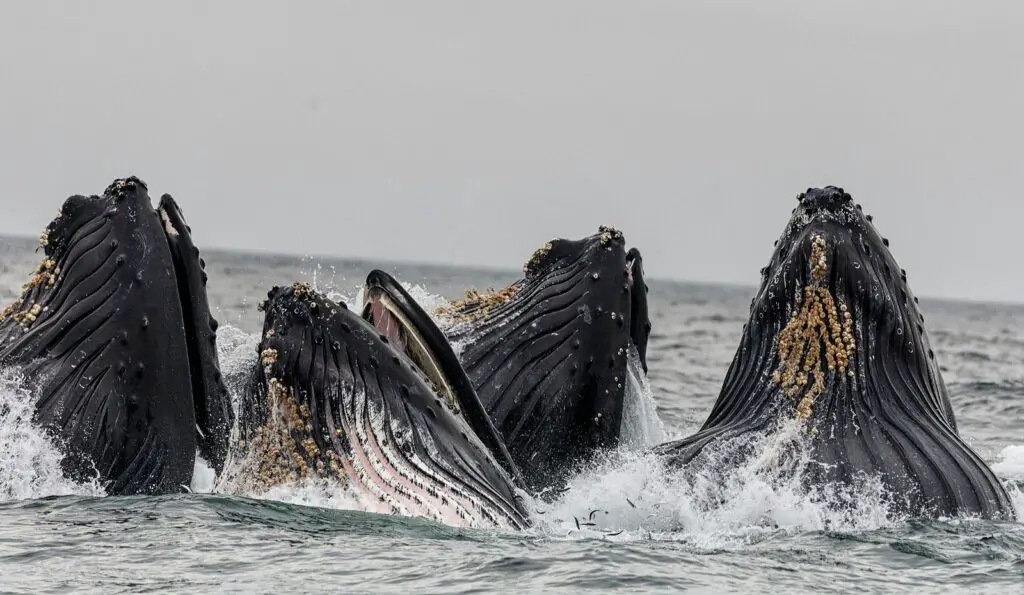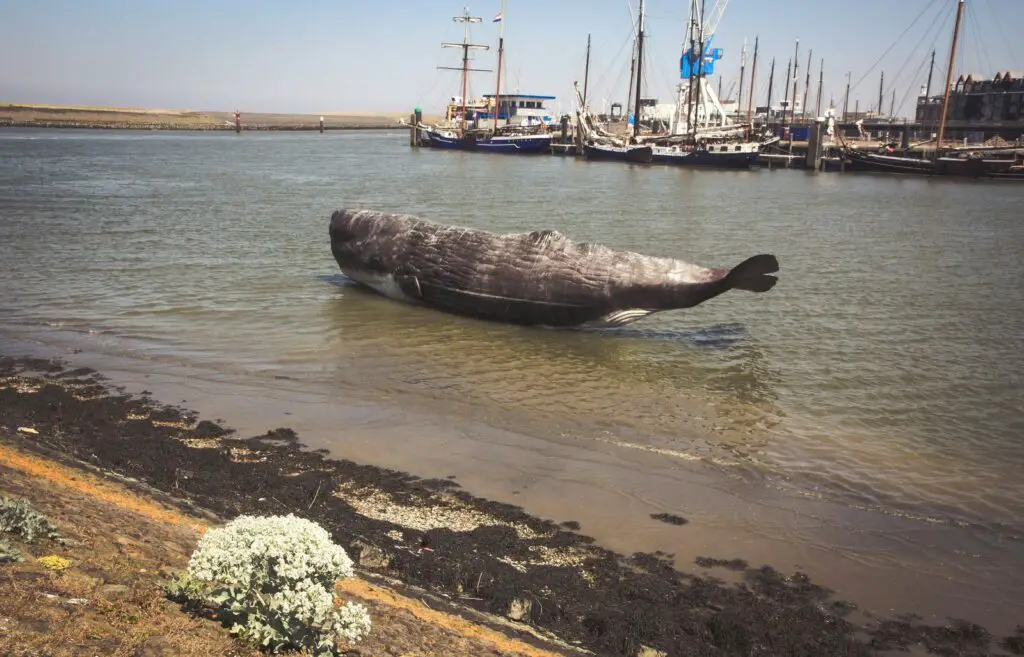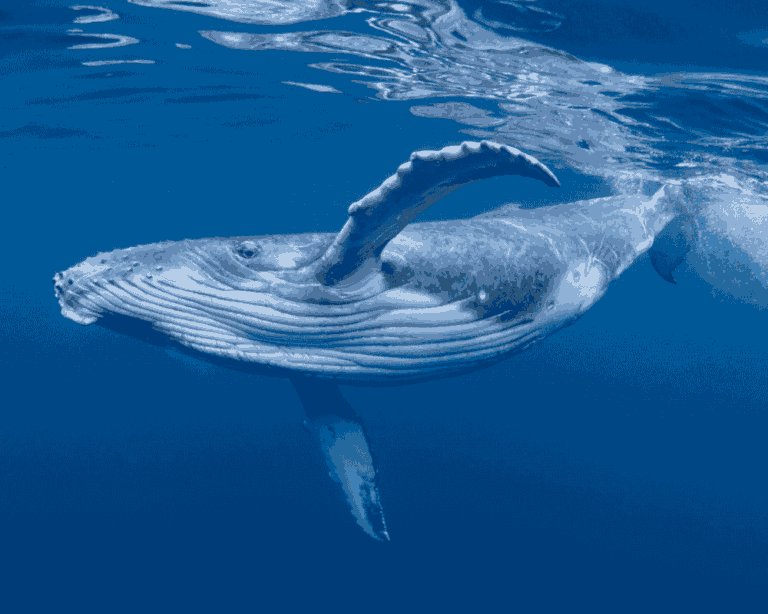Encountering whales in their natural habitats is a widespread desire among nature lovers and wildlife enthusiasts. Whale watching is a great experience and helps conserve these marine mammals.
Sustainable whale watching involves:
- Adhering to strict viewing protocols.
- Understanding the significant impact of human activity on whale behaviour.
- Supporting eco-conscious tour operators.
While the benefits of such practices are widely acknowledged, the challenges in enforcing and promoting these standards remain important.
How can stakeholders collaborate to uphold and advance these essential standards? This question raises further interest in the mechanisms harmonising tourist satisfaction with marine conservation.
Main Takeaway
- Minimise human impact on whales and promote conservation.
- Maintain safe distances and educate tourists on proper conduct.
- Use eco-friendly boats and noise-reduction technologies.
- Collaborate among tour operators, local communities, and stakeholders.
- Address challenges like disturbance to whales and environmental degradation.
- Select responsible tour operators and ensure tourists are well-informed.
- Support marine conservation through responsible practices and partnerships.

Understanding Sustainable Whale Watching
Sustainable whale watching prioritises the well-being of whales by implementing practices that minimise disruptive human interactions and promote marine conservation.
Responsible whale watching involves understanding the impact of human presence on these creatures. Operators who engage in sustainable whale-watching practices commit to educating their guests on proper conduct during tours, which includes maintaining a safe distance from the animals and avoiding actions that could stress or frighten them.
A key component of responsible whale watching is the collaboration between tour operators and local communities. This partnership helps foster a broader commitment to marine conservation and enhances the effectiveness of sustainable practices. Programs like Whale SENSE exemplify these efforts by setting stringent guidelines for commercial whale watching, ensuring that operators are well-informed about minimising their impact on whales.
Positive Aspects of Whale Watching
- Economic Benefits: Whale watching generates significant revenue for local economies, providing jobs and supporting local businesses.
- Conservation Awareness: Whale watching raises awareness about marine conservation issues. Tourists often gain a greater appreciation for whales and their habitats.
- Educational Opportunities: Whale watching provides a platform for educating the public about marine life, ecosystems, and the importance of protecting the ocean.
- Scientific Research: Whale-watching tours can support scientific research by providing platforms for researchers to observe and study whales in their natural habitats.
- Recreational Enjoyment: Whale watching offers tourists a unique and memorable experience, contributing to their overall well-being and enjoyment of nature.
Negative Aspects of Whale Watching
- Disturbance to Whales: Boats and tourists can disturb whales, causing stress and altering their natural behaviours. This can negatively impact their feeding, breeding, and migratory patterns.
- Environmental Degradation: Increased boat traffic and tourism infrastructure development can lead to habitat degradation, pollution, and other environmental issues that negatively affect marine ecosystems.
- Overcrowding: Popular whale-watching destinations can become overcrowded, diminishing tourists’ experiences and increasing pressure on local resources and the environment.
- Wildlife Exploitation: There is a risk that commercial whale watching can become exploitative, prioritising profit over the welfare of the animals and their habitats. This can lead to unethical practices and inadequate regulation.
- Carbon Footprint: Boat operations and tourist transportation contribute to greenhouse gas emissions.

Selecting Responsible Tour Operators
When choosing a provider, verifying their commitment to following strict environmental regulations is essential.
Commitments include maintaining safe distances from the whales to prevent stress and disruption in their natural behaviours.
Responsible tour operators should be transparent about their practices and protocols, especially how they handle encounters with sensitive groups like mother-calf pairs.
Mitigating noise pollution is also important, as excessive noise can harm whales. Operators using environmentally friendly boats that operate quietly and at slow speeds (no more than seven knots) greatly reduce the risk of disturbing marine life.
Whale Watchers Tour Operators Commitments
- Follow Guidelines and Regulations: Adhere to national and international whale-watching guidelines. These guidelines include maintaining safe distances, speed limits, and time restrictions around whales.
- Educate Passengers: Provide briefings about whale behaviour, the importance of conservation, and the guidelines for respectful whale watching. Ensure passengers understand how their actions can impact whales.
- Use Eco-Friendly Boats: Invest in fuel-efficient, low-emission boats to reduce the carbon footprint. Consider electric or hybrid engines to minimise noise and water pollution.
- Limit Boat Numbers: Restrict the number of boats allowed near whale pods at any given time. Implement a rotating schedule if necessary to prevent overcrowding.
- Hire Trained Guides: Employ guides with a strong marine biology or conservation background. They can provide accurate information and ensure that whale-watching practices are followed.
- Support Research and Conservation: Collaborate with researchers and conservation organisations. Share observational data to aid in scientific studies and support local conservation efforts financially or through advocacy.

Guidelines for Sustainable Whale Watching For Tourists
Pre-Tour Preparation
- Research and Choose Responsible Operators:
- Select tour operators with a demonstrated commitment to sustainability, evidenced by certifications or memberships in eco-friendly and conservation-focused organisations.
- Verify that operators follow local, national, and international whale-watching regulations.
- Educational Briefing:
- Ensure that tour operators provide educational materials or briefings about whale species, their behaviours, and conservation status before the tour.
- Encourage operators to inform guests about responsible wildlife viewing practices.
During the Tour
- Approach Distances and Speeds:
- Maintain a minimum distance of 100 meters (330 feet) from whales; increase this distance if whales are resting, feeding, or with calves.
- Reduce speed to a maximum of 7 knots within 300 meters (1,000 feet) of whales to minimise disturbance and the risk of collision.
- Behavioural Guidelines:
- Approach whales from the side and slightly to the rear, never head-on or from directly behind.
- Avoid sudden changes in speed or direction, and do not chase whales.
- Limit viewing time to 30 minutes to reduce stress on the animals.
- Noise Reduction:
- Use vessels with quiet engines or employ technologies that minimise underwater noise.
- Turn off engines if the boat is stationary near whales for extended periods.
- Minimise Pollution:
- Ensure no trash, oil, or other pollutants are released into the ocean.
- Use environmentally friendly products and practices on board.
- Respect Marine Life:
- Do not touch, feed, or swim with whales or other marine animals.
- Avoid disturbing other wildlife and marine habitats during the tour.
Post-Tour Activities
- Data Collection and Sharing:
- Participate in or support citizen science programs by recording and sharing sighting data with research organisations.
- Encourage tourists to share their observations and photos with conservation groups.
- Education and Advocacy:
- Provide post-tour materials that educate guests on how they can support marine conservation efforts.
- Encourage tourists to become advocates for marine conservation in their communities.
Operational Best Practices
- Training and Certification:
- Ensure all staff, including guides and crew members, are trained in marine biology, conservation, and responsible wildlife viewing practices.
- Seek certifications from recognised sustainable tourism and wildlife organisations.
- Community Engagement:
- Engage with local communities and Indigenous groups to ensure that whale-watching activities benefit the local economy and respect cultural practices.
- Support local conservation initiatives and marine protected areas.
- Regular Assessments:
- Conduct regular assessments of the environmental impact of whale-watching operations and implement improvements as needed.
- Stay updated with the latest research and guidelines on marine mammal conservation.
- Use of Eco-Friendly Technology:
- Invest in eco-friendly vessels like hybrid or electric boats to reduce carbon emissions and noise pollution.
- Implement waste reduction and recycling programs on board.
Policy Makers Commitments
- Develop and Enforce Regulations: Establish clear regulations for whale-watching activities, including guidelines for boat distances, speed limits, and the number of vessels allowed in whale habitats. Ensure these regulations are enforced.
- Promote Certification Programs: Encourage and support certification programs that recognise and reward sustainable and ethical whale-watching practices.
- Monitor Whale Populations: Implement monitoring programs to track whale populations and the impact of whale watching on their behaviour and health. Use this data to adjust regulations as needed.
- Engage Local Communities: Involve local communities in whale watching and conservation efforts. Provide education and training to ensure they benefit economically and become advocates for sustainable practices.
- Support Research: Fund research initiatives that study the effects of whale watching on whale populations and marine ecosystems. Use research findings to inform policy and management decisions.
Community and Cultural Respect
Community involvement is pivotal in increasing sustainable whale-watching practices and fostering greater public awareness.
Local partnerships, particularly with businesses and restaurants, are instrumental in promoting a culture of sustainability around whale watching. These collaborations can lead to the development of responsible whale-watching practices that respect marine habitats and contribute to the local economy positively. By supporting local businesses prioritising sustainability, tourists are indirectly involved in conservation efforts, boosting community support for these initiatives.
Conclusions
Sustainable whale watching requires the implementation of practices that ensure minimal disruption to whale behaviour, such as maintaining safe distances and avoiding actions that could cause stress.
Educating tourists about responsible wildlife viewing and marine conservation is a key component of sustainable whale watching. Tour operators must be committed to these principles, use eco-friendly boats, and adhere to strict protocols.
Collaboration among tour operators, local communities, and stakeholders is essential for harmonising tourist satisfaction with conservation goals. Programs like Whale SENSE exemplify effective guidelines that help minimise human impact on whales. While the benefits of sustainable whale watching include economic gains, increased conservation awareness, and support for scientific research, challenges such as potential disturbances to whales, environmental degradation, and overcrowding must be addressed.
It is important to select responsible tour operators who adhere to environmental regulations and engage in transparent practices. Tourists should be well-informed and follow guidelines to reduce their impact on marine life. Operators should invest in staff training, community engagement, and eco-friendly technology to support conservation efforts.
Policymakers are critical in developing and enforcing regulations, promoting certification programs, and supporting research initiatives.
Engaging local communities in conservation efforts ensures economic benefits and cultural respect. Local partnerships with businesses prioritising sustainability further contribute to conservation efforts and foster community support.
Sustainable whale watching is a collective effort that requires ongoing commitment and cooperation to protect marine ecosystems while providing valuable experiences for tourists.



